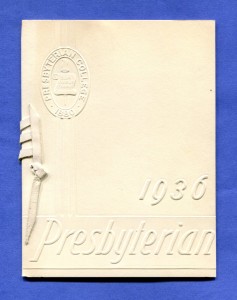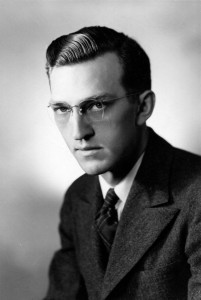Hugh Holman ’36, class poet
May 2014
In preparation for Commencement in 1936, class historian and poet, Hugh Holman wrote a poem that was published in the commemorative Commencement program given to the seniors that year. Hugh Holman went on to become “a versatile South Carolina man of letters,” wrote Ben Hay Hammet in 1959.
Commencement, ’36

1936 Commencement Program Presbyterian College Archives and Special Collections
No more in lecture rooms and cloistered halls
Will we feel quiet learning’s fervent thrill;
No more will sheltered paths and ivied walls
Be boisterous playgrounds for our youthful will;
The hearts heaped high on our fraternal fires
Will now soon cool to memories’ sweet sad glow;
The fierce wild hope that touched the youthful lyres
Of loyal hearts will fade as dreams move slow;
Our deeds will rest on memories’ trophy case;
Friendships will fade to pleasant reverie,
But ever mounting years can ne’er erase
These college days of youthful ecstasy.
With happy pride we greet th’approaching end,
Yet joy and sorrow now together blend.
Hugh Holman, ’36

Hugh Holman
Clarence Hugh Holman was born in Cross Anchor, South Carolina in 1914. His family moved to Goldville, now known as Joanna, South Carolina where he spent most of his youth. He graduated from Presbyterian College in 1936 with honors, earning a B.S. in Chemistry and an A.B. in English. Participating in a variety of extra-curricular activities, Holman worked on the staff of three PC student publications during his college years: The Blue Stocking newspaper all four years, serving as editor his senior year, and The Collegian and the Pac Sac yearbook staffs during his last two years. Majoring in English and Chemistry, he also served as a student assistant in both departments. Upon his graduation, he was hired to direct public relations at Presbyterian College between 1936 and 1939, a position later filled by Ben Hay Hammet in 1949. Holman later served as director of the radio department on campus, writing and editing over 100 educational radio scripts for the college. One such script, an adaptation of the story, “Mr. Charles” by Donald Hough, was sold to and heard over the Columbia Broadcasting System. [PC Archives, Jane Sturgeon scrapbook, c. 1940-41]
After joining the PC faculty in 1939, Holman was appointed Academic Dean by new president, Dr. Marshall W. Brown in 1945. Once a professor of Holman’s, Brown stated to The Blue Stocking staff that “I secured his appointment as Dean because years of association with him had convinced me that he had a knowledge greater than that possessed by a number of men who had advanced degrees, an unusual efficiency in routine work, and a great creative talent.” [The Blue Stocking, Dec. 7, 1962]
During his career at Presbyterian, Holman wrote a series of five detective novels. He was also an academic coordinator and instructor of physics for the 39th Army Air Force college training detachment at PC during World War II.
According to an article in the August 29, 1946 Clinton Chronicle, Mr. Holman was granted a three-year leave of absence in 1946 to begin work on a Ph.D. in American Literature. His dissertation at UNC was titled ”William Gilmore Simms’s Theory and Practice of Historical Fiction.”
Upon earning his Ph.D. at Chapel Hill in 1949, Dr. Holman received Phi Beta Kappa honors and was appointed Kenan professor of English at UNC. He later served as chairman of the English Department, chairman of the Humanities Division, chairman of the University Press Board of Governors, and dean of the UNC graduate school. In 1966 he was named the first Provost at UNC.
By 1966, this “writer-teacher-scholar-administrator” was the author of “five books and 50 articles on literary subjects.” A noted critic on southern literature, he was a recognized authority on the works of Thomas Wolfe and the editor of numerous publications on the author, including a Scribner research anthology titled The World of Thomas Wolfe. He also revised and enlarged the classic Thrall-Hibbard Handbook to Literature, a standard reference for graduate and undergraduate English students. [Presbyterian College Press Release, November 16, 1966, Ben Hay Hammet]
Other honors received by Dr. Holman include a Presbyterian College Alumni Citation awarded during the Diamond Jubilee Convocation in 1955, a PC Honorary Degree of Doctor of Literature, a Thomas Jefferson Award from UNC in 1975, a Simon Guggenheim Fellowship in 1967, and the Oliver Max Gardner Award in 1977. Holman’s scholarly interests focused on southern literature which led him to become one of the founding editors of the Southern Literary Journal. He also played a key role in creating the National Humanities Center located at North Carolina’s Research Triangle Park. This center provides scholars the opportunity to spend a year researching and writing on subjects in the humanities.
Dr. Holman returned to Presbyterian many times over the years. Because of his scholarly pursuits and academic success at such a high level, Dr. Holman was selected as the principal speaker at the dedication of PC’s James H. Thomason Library in September 1974.
Presbyterian College is proud to count this accomplished man among both our alumni and our former faculty/staff members. As we gather to celebrate Commencement after the end-of-year rush through classes, extra-curricular activities, and exams, we look back on the college careers of the members of our senior class. The words Hugh Holman wrote almost 80 years ago are still remarkably apt today. Despite today’s personal electronic devices, social media and other technology, the most important things about the college experience which are mentioned in Holman’s poem above have not changed that much through the years. As senior class poet, he was a young man who possessed the maturity and insight to look back on his college years and reflect on those experiences before he left them behind.
With happy pride we greet th’approaching end, yet joy and sorrow now together blend.
